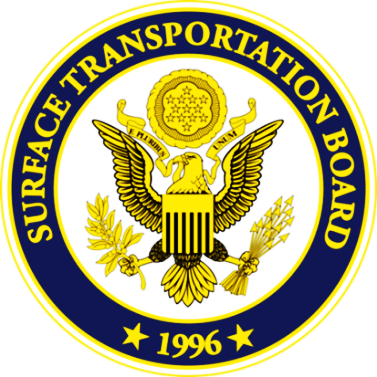
FOR RELEASE
06/13/2022 (Monday) [PDF Version]
No. 22-32
Contact:
Michael Booth
202-245-1760
FedRelay 1 (800) 877-8339
The Surface Transportation Board today issued an order directing BNSF Railway Company (BNSF), CSX Transportation, Inc. (CSX), Norfolk Southern Railway (NSR), and Union Pacific Railroad (UP) to correct deficiencies in their rail service recovery plans filed in response to a Board order issued on May 6, 2022. The Board had required these four Class I carriers to develop service recovery plans as a result of the severe service deficits presently permeating their rail networks. The Board is also ordering these carriers to provide additional information on their actions to improve service and communications with their customers as well as additional detailed information to demonstrate their monthly progress in increasing the size of their work forces to levels needed to provide reliable rail service.
The service recovery plans, together with the additional requested information, are crucial components of the Board’s active monitoring of the Nation’s freight rail industry and particularly the Board’s focused efforts to ensure that the large carriers overcome the significant service challenges affecting many rail users and the public.
On April 26 and April 27, 2022, the Board held a two-day public hearing on the recent significant performance deterioration of the freight rail industry. At the hearing, the Board heard compelling testimony from shipper and labor witnesses about the severity and dire impacts of substandard rail performance, in addition to insights presented by U.S. Secretary of Transportation Pete Buttigieg and U.S. Deputy Secretary of Agriculture Jewel H. Bronaugh. The Board also heard testimony from BNSF, CSX, NSR, and UP about the causes, extent, and likely duration of service disruptions, and their remedial initiatives.
In response to the extensive problems described at the hearing, on May 6, 2022, the Board issued an order requiring the four largest U.S. railroads – BNSF, CSX, NSR, and UP – to file service recovery plans that would specifically describe their key remedial initiatives and promote a clearer vantage point into operating conditions on the rail network.
Unfortunately, these four carriers submitted plans that were perfunctory and lacked the level of detail that was mandated by the Board’s order. The plans generally omitted important information needed to assure the Board and rail industry stakeholders that the largest railroads are addressing their deficiencies and have a clear and measurable trajectory for doing so. Of particular concern was the fact that UP and NSR flatly refused to provide the six-month targets for achieving their performance goals explicitly required by the Board’s order. Because of the plans’ shortcomings, the Board finds it necessary to require the railroads to supplement their plans and provides explicit further instruction on the critical information they must include.
“Freight rail is critical to our Nation’s economy, and we must ensure the railroads are doing everything within their means to transport commodities that are crucial to the public welfare, such as animal feed, food ingredients, fuel products and fertilizers, and critical chemicals,” said Chairman Martin Oberman. “We are in the middle of a rail service crisis and the Board continues to receive reports about persistent, acute, and dramatic problems in rail transportation, disrupting critical supply chains and shutting down companies. The freight rail industry is currently struggling to provide adequate rail service, yet the service recovery plans we received are woefully deficient and do not comport with the spirit or the letter of the Board’s order. The plans simply failed to instill confidence that the carriers have a serious approach to fixing a problem caused by their own lack of preparedness to respond to external shocks and fluctuations in demand, including especially short-sighted management of labor forces and other resources. While the railroads must always comply with Board orders, it is particularly disturbing that the railroads failed to comply with the order requiring them to file adequate service recovery plans. Under circumstances where service is not meeting customers’ needs, this is not too much to ask from highly sophisticated companies with important public responsibilities. I had expected a better response from the carriers to the Board’s previous order, and now with more explicit instructions, which should not have been needed, there will be no excuse for continued lack of compliance.”
A recording of the Board’s April 26 and 27, 2022 hearing in Urgent Issues in Freight Rail Service, may be viewed on the Board’s YouTube page. The May 5, 2022 decision in Urgent Issues in Freight Rail Service—Railroad Reporting, Docket No. EP 770 (Sub-No. 1), may be viewed and downloaded here and today’s decision may be viewed and downloaded here.
###
 An official website of the United States government
An official website of the United States government


